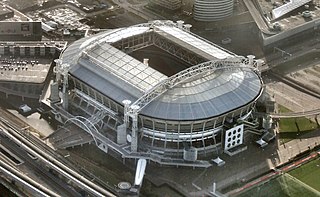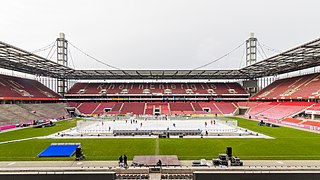The playoffs, play-offs, postseason or finals of a sports league are a competition played after the regular season by the top competitors to determine the league champion or a similar accolade. Depending on the league, the playoffs may be either a single game, a series of games, or a tournament, and may use a single-elimination system or one of several other different playoff formats. Playoff, in regard to international fixtures, is to qualify or progress to the next round of a competition or tournament.
A tournament is a competition involving at least three competitors, all participating in a sport or game. More specifically, the term may be used in either of two overlapping senses:
- One or more competitions held at a single venue and concentrated into a relatively short time interval.
- A competition involving a number of matches, each involving a subset of the competitors, with the overall tournament winner determined based on the combined results of these individual matches. These are common in those sports and games where each match must involve a small number of competitors: often precisely two, as in most team sports, racket sports and combat sports, many card games and board games, and many forms of competitive debating. Such tournaments allow large numbers to compete against each other in spite of the restriction on numbers in a single match.

The Belgian Pro League is the top league competition for association football clubs in Belgium. Contested by 18 clubs since the 2020–21 season and reduced to 16 teams from the 2023–24 season onwards, it operates on a system of promotion and relegation with the Challenger Pro League.
The Belgian Second Division was the second-highest division in the Belgian football league system, one level below the Belgian Pro League. It was founded by the Royal Belgian Football Association in 1909 and folded in 2016, when it was replaced by the Belgian First Division B.
The Belgian Second Division play-offs were a series of playoff matches to decide promotion to the Belgian Pro League, organised between 1974 and 2015. Following a large reform of the Belgian football league system at the end of the 2015–16 season, the play-offs were no longer held. In the earlier years these play-offs were contested by teams of the Belgian Second Division but since 2009 also a team from the Belgian Pro League took part. Four teams normally played these play-offs, with the winner being promoted to the Belgian Pro League.
The Belgian Third Division was the third highest level in Belgian football. It had two leagues of 18 teams each at the same level. This competition, originally known as the Belgian Promotion was first played in the 1926-27 season with three leagues, then with four leagues between 1931 and 1952. From 1952 on, only two leagues remained and the competition was named the Third Division. Originally set to 16 clubs, the number of clubs in each division was increased in 2009 to 18 clubs. At the end of the regular season, both league winners promoted to the second division and a play-off was played to determine a possible third club to promote. The champion of the third division was determined after a two-legged match between the winners of the two leagues. If those matches ended in a draw, a third match was played on a neutral ground. However, in recent years this final game was not organised anymore due to lack of interest. In 2016, the Belgian Third Division was replaced by the Belgian Second Amateur Division.
The Belgian Provincial leagues are the lower leagues for Belgian football. Until 2016, these were at levels 5-8 in the Belgian football league system however as part of the reform an extra level was created causing the provincial leagues to drop to levels 6-9. The provincial leagues are divided into 9 regional league systems. Each league system is itself divided into 4 levels. The number of leagues at each level depends on the province, but every province must have only one league at the top level. The best teams from the 9 first divisions can promote to the Belgian Division 3, the fifth and lowest level in the national leagues.
The Belgian Fourth Division D was one of the four leagues at the fourth level of the Belgian football league system, the other ones being the Belgian Fourth Division A, B and C. This division existed from the 1952–53 to 2015–16 seasons and was played every year with 16 clubs in each league. The league was replaced by the Belgian Second Amateur Division.

The 2011–12 UEFA Europa League was the third season of the UEFA Europa League, Europe's secondary club football tournament organised by UEFA, and the 41st edition overall including its predecessor, the UEFA Cup. It began on 30 June 2011 with the first legs of the first qualifying round, and ended on 9 May 2012 with the final held at Arena Națională in Bucharest, Romania. As part of a trial that started in the 2009–10 UEFA Europa League, two extra officials – one on each goal line – were used in all matches of the competition from the group stage.
The 2010–11 season of the Belgian Pro League is the 108th season of top-tier football in Belgium. It began on 30 July 2010 with the first match of the regular season and ended in May 2011 with the last matches of the playoff rounds. Anderlecht were the defending champions.
The 2010–11 football season in Belgium, which is the 108th season of competitive football in the country and runs from August 2010 until July 2011.
The 2010–11 Serie D was the sixty-third edition of the top level Italian non-professional football championship. It represented the fifth tier in the Italian football league system. It originally consisted of 166 teams, with two divisions allocated 20 teams each while the other seven allocated 18 teams. After the first matchday, another team was added, increasing the number of teams to 167 and Girone I to 19 teams.

The 2012–13 UEFA Europa League was the 42nd season of Europe's secondary club football tournament organised by UEFA, and the 4th season since it was renamed from the UEFA Cup to the UEFA Europa League.
The 2011–12 season of the Belgian Second Division started in August 2011 and is the second tier football league in Belgium. The league is played by 18 teams, with 34 matchdays of 9 matches each, so each team plays the 17 other teams twice. The season is divided into 3 periods, the first period of 10 matches, the second of 12 matches and the third of 12 matches. Each period winner qualifies for the Belgian Second Division Final Round. On 14 April 2012, Charleroi became champions without playing as closest rivals Eupen and Oostende both did not manage to win their matches and thereby could no longer mathematically overtake Charleroi in the standings.
The 2012–13 season of the Belgian Pro League was the 110th season of top-tier football in Belgium. It started on 28 July 2012 with the first match of the regular season between Kortrijk and defending champions Anderlecht, and ended on 26 May 2013, which was the return leg of the European playoff.
The 2013–14 season of Division 1, the third tier of ice hockey in Sweden, organized by the Swedish Ice Hockey Association (SIHA), began on 11 September 2013. The regular season concluded on 16 February 2014. The following playoffs towards the qualifier to the second-tier league HockeyAllsvenskan began on 19 February 2014 and ended on 7 March 2014. The qualifiers to Division 1 began on 2 March 2014 and ended on 26 March 2014. The qualifier to HockeyAllsvenskan began on 13 March 2014 and ended on 5 April 2014. The 2013–14 season was the last season the league was named "Division 1"; in April 2014, the league was renamed "Hockeyettan".
The 2014–15 season of the Belgian Pro League is the 112th season of top-tier football in Belgium. It started on 27 July 2014 and finished in May 2015. K.A.A. Gent won the league, making it the first championship title in their 115-year history.

The Challenger Pro League is the second-highest division in the Belgian football league system, one level below the Belgian First Division A. It was created by the Royal Belgian Football Association in 2016, replacing the Belgian Second Division. From the season 2016–17 until 2019–20, the competition was named Proximus League, after the main sponsor Proximus.

The 2019–20 UEFA Europa League was the 49th season of Europe's secondary club football tournament organised by UEFA, and the 11th season since it was renamed from the UEFA Cup to the UEFA Europa League.
The 2021–22 Belgian First Division A was the 119th season of top-tier football in Belgium.




